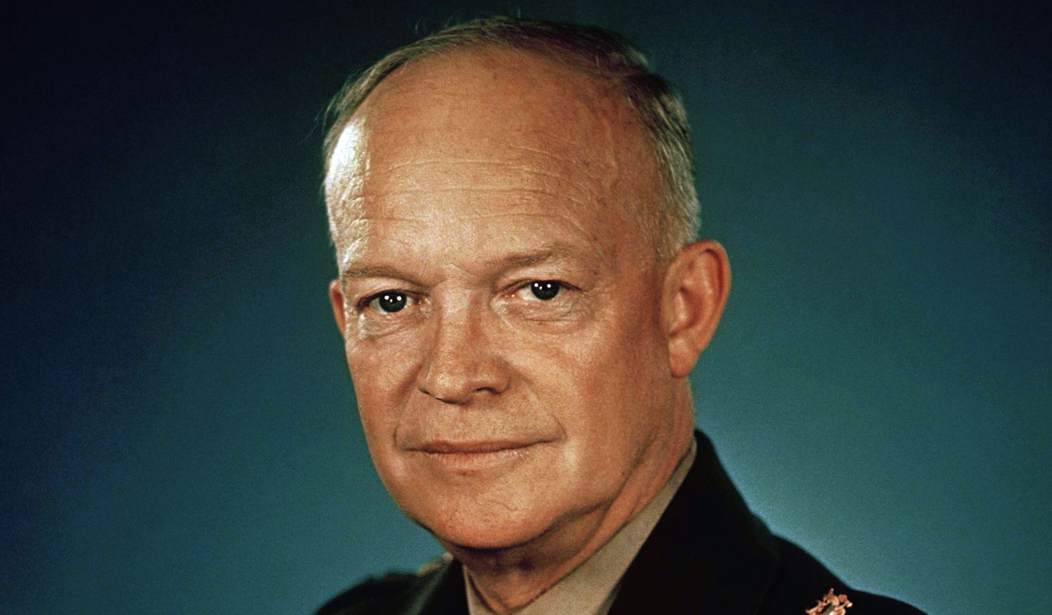In his last few days as President, Dwight D. Eisenhower gave a televised speech in which he warned the nation about the dangers of what he referred to as the “military-industrial complex” (MIC).
FACT-O-RAMA! Once upon a time, anyone using the phrase “military-industrial complex” was considered a tinfoil hat nutjob. Today, we know that manufacturing companies — and those who own stock in them — have made trillions of dollars in military government contracts in the past 60 years.
Eisenhower would know about the MIC. He presided over the European Theater of Operations during WWII. He was president during the largest expansion of the MIC in history as the U.S. manufactured acres of armaments, warehouses of bombs, and B-52 bombers to deliver them to Soviet cities, not to mention the Vietnam War, at a moment’s notice.
Related: The Democrat-Media-Industrial Complex Is Doubling Down on Censorship
Eisenhower wisely delivered his speech warning the nation about the MIC when he was leaving office, perhaps not wanting to anger the CIA. This is the important part of what he said:
Our military organization today bears little relation to that known by any of my predecessors in peacetime, or indeed by the fighting men of World War II or Korea.
Until the latest of our world conflicts, the United States had no armaments industry. American makers of plowshares could, with time and as required, make swords as well. But now we can no longer risk emergency improvisation of national defense; we have been compelled to create a permanent armaments industry of vast proportions. Added to this, three and a half million men and women are directly engaged in the defense establishment. We annually spend on military security more than the net income of all United States corporations.
This conjunction of an immense military establishment and a large arms industry is new in the American experience. The total influence — economic, political, even spiritual — is felt in every city, every State house, every office of the Federal government. We recognize the imperative need for this development. Yet we must not fail to comprehend its grave implications. Our toil, resources and livelihood are all involved; so is the very structure of our society.
In the councils of government, we must guard against the acquisition of unwarranted influence, whether sought or unsought, by the military-industrial complex. The potential for the disastrous rise of misplaced power exists and will persist. Akin to, and largely responsible for the sweeping changes in our industrial-military posture, has been the technological revolution during recent decades.
We must never let the weight of this combination endanger our liberties or democratic processes. We should take nothing for granted. Only an alert and knowledgeable citizenry can compel the proper meshing of the huge industrial and military machinery of defense with our peaceful methods and goals, so that security and liberty may prosper together.
In this revolution, research has become central. It also becomes more formalized, complex, and costly. A steadily increasing share is conducted for, by, or at the direction of, the Federal government.
The next two paragraphs seem to have been presciently written for Dr. Facui.
Today, the solitary inventor, tinkering in his shop, has been overshadowed by task forces of scientists in laboratories and testing fields. In the same fashion, the free university, historically the fountainhead of free ideas and scientific discovery, has experienced a revolution in the conduct of research. Partly because of the huge costs involved, a government contract becomes virtually a substitute for intellectual curiosity. For every old blackboard there are now hundreds of new electronic computers.
The prospect of domination of the nation’s scholars by Federal employment, project allocations, and the power of money is ever present.
Let’s take a historical look at the presidents who played nice with the CIA and MIC and those who did not.
Eisenhower left office warning the nation about the danger of the MIC.
John F. Kennedy fired CIA leader Alan Dulles and was planning to end the CIA. He refused to invade Cuba and was also considering withdrawing from the Vietnam War. This would have been bad for the CIA and the MIC. JFK gets killed by a “crazy, lone gunman.”
CIA: Win
MIC: Win
Lyndon B. Johnson allowed former CIA chief Alan Dulles (who was fired by JFK) to take a high-ranking post on the Warren Commission — which cleared the CIA of any wronging in the death of JFK. LBJ also escalated the war in Vietnam.
CIA: Win
MIC: Win
Richard Nixon allegedly told the head of the CIA, “I know who killed John [Kennedy],” hinting he knew the CIA was involved. This was bad for the CIA. Nixon also ended U.S. involvement in the Vietnam War (bad for the MIC). Nixon was forced out of office after — according to Fox News’s Tucker Carlson — four undercover CIA agents broke into the Watergate building and framed him for it. You can watch the Tucker Carlson report below.
CIA: Win
MIC: Win
TUCKER: On June 23, 1972, Nixon met with CIA Director Richard Helms at the White House. During the conversation Nixon suggested he knew who shot JFK.
Nixon further implied that the CIA was directly involved in Kennedy’s assassination.
Helms' telling response: Total silence pic.twitter.com/nlYHCc8KTa
— Benny Johnson (@bennyjohnson) January 20, 2023
Gerald Ford worked on the Warren Commission, which cleared the CIA of JFK’s murder, and was in no hurry to implicate himself. Ford also tried to get Congress to send more military aid to South Vietnam but failed.
CIA: Win
MIC: Appreciated the effort
Jimmy Carter did not start a war, even though Iran took 52 American hostages for 444 days. He served only one term as president.
CIA: DRAW
MIC: LOSS
Ronald Reagan allowed his CIA to run amok. He escalated the arms race with the USSR, though he also hated communism. Eventually, he ended the lucrative, four-decade Cold War — a HUGE loss for the MIC. Regan was shot by a “crazy, lone gunman.” Had he died, his replacement would have been a former CIA chief, George H. Bush.
CIA: WIN
MIC: LOSS
George Bush, Pt. I was a former CIA chief and was very CIA-friendly. He started a war in Iraq.
CIA: Win
MIC: Win
Bill Jefferson (B.J.) Clinton started an air war in former Yugoslavia. A book, Partners in Power: the Clintons and Their America, claims BJC was very friendly with the CIA, perhaps since his college days.
CIA: Win
MIC: Win
George Bush, Pt. II: Electric Boogaloo went to war in Iraq and Afghanistan, plus his dad was very friendly with the CIA.
CIA: Win
MIC: Win
Barack Obama maintained war in Afghanistan and refused to demolish ISIS, thus keeping the battle going. The book The Manufacturing of a President: The CIA’s Insertion of Barack H. Obama, Jr. into the White House suggests the CIA helped get Obama elected. Obama gave the CIA more power, re: warrantless spying.
CIA: Win
MIC: Win
Donald Trump didn’t get along with the CIA. He fast-tracked the end of ISIS, and drew down in Afghanistan. He is the first president in decades not to start a war. This is bad for CIA and MIC. Despite getting more votes than any incumbent president in history, Trump “loses” the 2020 election.
CIA: LOSS
MIC: LOSS
Joe Biden takes office and immediately leaves $88 billion worth of MIC material in Afghanistan, which must now be replaced (Cha-CHING). He also sends almost $100 billion to Ukraine to buy weapons — from the MIC (Cha-cha-cha-CHING).
CIA: Win
MIC: Win
What Have We Learned?
Eisenhower knew what he was talking about. Every president who opposed the CIA, ended a war (even the Cold War), and/or didn’t start a war has either gotten shot or lost reelection. Those who have played nice with them kept their jobs and heads.
It should be noted that Jimmy Carter was less popular than Nixon and very likely lost re-election due to his inept handling of the Iran hostage situation.
John Hinkley, Jr., Reagan’s would-be assassin, was found not guilty by reason of insanity. But Trump ally Roger Stone argued that George Bush Pt. I was involved in the attempt to kill Reagan in his book Jeb! and the Bush Crime Family: The Inside Story of an American Dynasty.
COINCIDENCE-O-RAMA! John Hinkley’s brother Scott was chummy with Neil Bush. They both owned or worked for companies in the gas and oil industry. They had planned to meet for dinner in Neil Bush’s home the day John Hinckley shot Reagan and three other people.
“There are two shooters in the Reagan assassination attempt, not one,” Stone told Philadelphia radio legend Rich Zeoli. “I give you photographic evidence and eye-witness evidence of a second man standing on a balcony holding a gun, who can clearly be seen in the uncropped photos, and I traced many of the connections of the Bushes to the Hinckleys. It’s more than you’ve been told.”










Join the conversation as a VIP Member